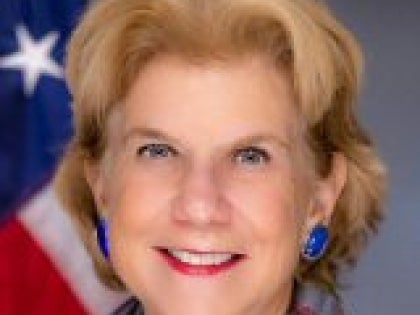
Politico: What the Senate education chair expects in Albany this year
Katelyn Cordero
January 9, 2024
-
ISSUE:
- Education

Sen. Shelley Mayer (D-Yonkers) heads the Senate Education Committee and laid out her goals for the six-month legislative session in Albany. | Hans Pennink/AP Photo
ALBANY, N.Y. — Last year’s budget led to a record increase in funding for education. This year, Senate Education chair Shelley Mayer is looking to continue the momentum.
As of late Monday, Mayer said she had yet to see what Gov. Kathy Hochul will propose in her State of the State address Tuesday. But she is hopeful that the governor will continue the precedent set last year with fully funding foundation aid so that it accounts for rises in inflation.
Beyond that, it’s unclear what the governor will propose, aside from $10 million earmarked for a reading initiative. The governor has warned of a $4 billion budget shortfall, prompting calls for agencies to hold the line.
“I don’t like to start with, ‘It’s a tight budget.’ I start with what we need, and then there’s a tight budget,” Mayer (D-Yonkers) said in an interview Monday in her office at the state Capitol.
Advocates are also now eyeing ways to update the antiquated formula used to divide foundation aid — the largest school aid budget line — which appears to be an uphill battle. Mayer said she would like to see funding in the budget for a study spearheaded by the state Education Department that would research potential changes.
Other issues in education that Mayer says she will be eyeing this session include moving the state’s reading curriculum away from older curriculums and towards a “science of reading;” a revamp of the state’s teacher evaluation system; a fully-funded universal school meals program, and funding to create community school models across the state.
This interview has been edited for length and clarity.
What are your top priorities entering the legislative session?
The first thing is that we want: Foundation aid to be fully funded with the inflationary factor, because schools are facing a potential drop-off of federal funds. There is a significant inflationary factor, and it’s going to be expensive.
I’ve just finished a tour of about 11 school districts throughout the state. Urban, rural, suburban schools are doing very innovative and creative things to address social emotional health and academic learning loss — and to ensure that students graduate really prepared. But those things all cost money. So we have to have the full funding of foundation aid.
There obviously is conversation about whether some aspects of the formula ought to be revisited. We asked last year — and we’ll ask again — I believe for the state Education Department to have funding to retain a consultant to begin to examine the foundation aid formula and see whether certain elements in it ought to be modified.
I think we’re going to continue to expand full day pre-kindergarten to more districts outside New York City. But at the same time, we have to make the funding and the operations of that formula work more effectively. It is not a perfect system. Some schools aren’t getting enough.
I think we’re going to continue to support community schools, which is a much more integrated model of support for families, recognizing that a lot of our challenges are not just the child but the child in the family. And most of the schools I visited have really stepped up in that space.
What sort of changes could be made to the foundation aid formula?
We’re using 2000 census data; we’re using free and reduced lunch as a proxy for poverty. Some of these things are no longer accurate. On the other hand, they may have disadvantageous results to some districts. So we need a professional company or a person to do it. And we’re going to push again to have the resources to do that.
The governor already announced an initiative to revamp reading curriculums. Are you supportive of this?
The governor, to her credit, has begun a serious conversation about the science of reading and implementing it statewide.
We look forward to seeing the details on how money will be spent, what school districts will be expected to do, and what state education will be expected to do.
But I think our conference is going to be very supportive of moving to a science of reading, emphasis and approach that will ensure that more students learn to read by third grade.
There’s been concerns over the zero-emission bus mandate. Is there any consideration for granting districts with flexibility?
We know there’s some pushback on the money and the operation. We’re going to work with the school districts.
We’re going to work with whatever federal money, and hopefully we’ll get some other money — there’s money in the (Environmental) Bond Act for this. But we recognize schools are quite anxious about the details, and we’ll work with them.
But the other side of it is, schools can’t be last in this iteration of moving towards vehicles that reflect a change in climate. We just can’t be, and so we’re going to work with them and push them at the same time.
Where do negotiations stand in terms of revamping that state’s teacher evaluation system?
I think there will be a consensus of how to move forward towards an evaluation system that is fair to teachers and staff and principals, that is good for parents and fair for administrators.
I’m hopeful we’ll reach a consensus. We did not last year, but I think we will.
Are there any actions that can be taken by the Legislature to combat hate speech in schools?
For me personally, I’m going to continue to push on how we address antisemitism, Islamophobia and racism in our schools. I don’t believe our students understand enough about the historical context of these issues.
There’s a number of creative curriculum projects by not-for-profit groups. A number of faith communities are now joining together to come up with new ways to talk about this. Maybe we have to do a pilot and fund it to get our foot through the door and see how something does.
We can’t just throw our hands up and walk away. Our kids do not know enough complexity of American history. They don’t know the full story of the terrible things in American history and the good things in American history. We just have not done a good enough job on these issues, and we need to do better.
We have bills on curriculum in all these areas, and we’ve steered away from that. But at the same time, we need to come up with a solution. And I’m quite committed to finding something.
What have the conversations been like surrounding districts managing an influx of migrant students?
I’m very confident that there will be a strong ask from New York City, as well as our colleagues, to have additional money allocated for such a large number of new students — the need for ELL teachers, districts outside New York City that have a disproportionate impact, and in New York City where you have tens of thousands of students coming into our system.
The number of students we’re talking about, and their needs, require that we do have additional funding.
Frankly, the feds should do it. But the feds so far haven’t done it. And so our obligation is to these districts and these kids, and we have to fight for that money. We’ll wait to see what the governor puts in.
Share this Article or Press Release
Newsroom
Go to NewsroomI-95 Upgrade: $86.7M Project Kicks Off in Westchester
August 17, 2025
